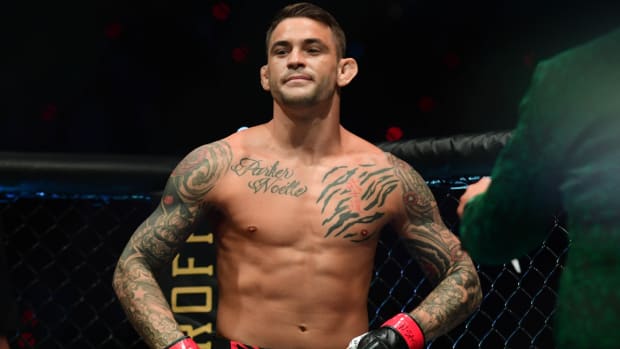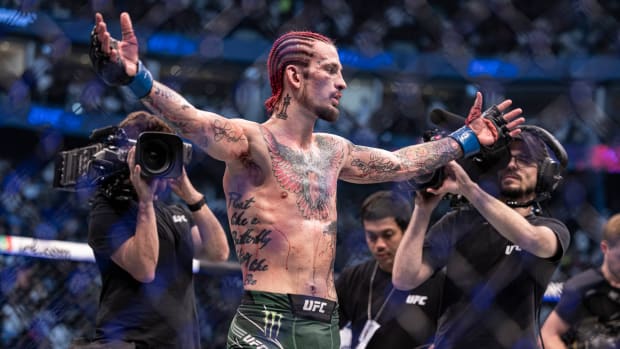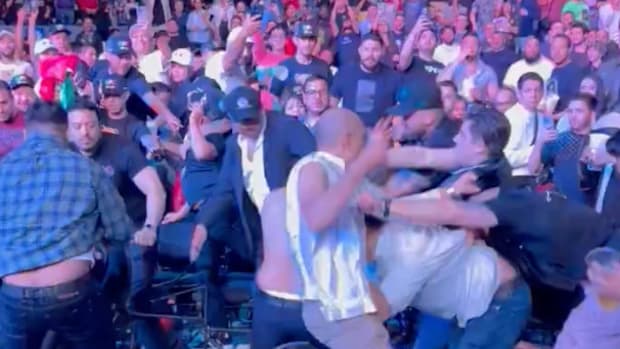Tito Ortiz, a titan of the UFC, has a history-making theatrical entrances and putting on wild performances. But this was something else entirely. On June 1, 2021, attending an in-person meeting as a Huntington Beach, Calif., city councilman, Ortiz stood before his colleagues and announced that, with three and a half years left on his four-year term, he was stepping down.
In nearly a quarter century as a mixed martial arts light heavyweight, Ortiz officially tapped out only twice. And each of those times came when an opponent was about to divorce him from consciousness or snap his tendons. On this night, the night of his third tap, the capitulation was occasioned by more mundane reasons.
Ortiz would claim that since his swearing in as an unlikely Huntington Beach political dynamo, he had been treated “with hostility and judgment” by other council members; that he had been a victim of character assassination at the hands of the media; that his family was being persecuted. Ortiz reckoned that whatever good he had hoped to contribute to his city would not be possible as an elected official. “To put it simply,” Ortiz said, “this job isn’t working for me.”
This early exit brought an end (for now, at least) to a surprisingly colorful and high-profile political career for somebody holding municipal office. It deepened schisms in an American community that, like so many, was already riven by mistrust and distrust. It also served as a cautionary parable for what can happen when celebrity candidates—low on expertise and experience; high on name recognition—are voted into office.
The impetus behind Tito Ortiz’s foray into politics was never particularly clear. Even Ortiz’s closest friends do not describe him as an intellectual. Friends and contemporaries of Ortiz, now 47, say that during his years in the UFC, his strongest views pertained to fighting and his long-running feud with his one-time manager, Dana White, who would later become UFC’s president.
It was White who, in 2018, told Barstool, “Oscar De La Hoya is Elon Musk compared to Tito Ortiz. Tito Ortiz is one of the dumbest creatures walking the face of the Earth right now. If you take all living things and put them in a barrel, Tito is the dumbest out of everything.”
But like White, Ortiz may have been pushed toward the culture wars by his long-running connection to Donald Trump. During the UFC’s fight for legitimacy in the late 1990s and early 2000s, New Jersey became the first state in the union to regulate MMA under what is now considered the Unified Rules of the sport and Trump jumped at the chance to host UFC events at his casino properties in Atlantic City.
When Ortiz headlined UFC 30 in 2001, he did so at the Trump Taj Mahal. And in ’06, after Ortiz lost his famous rematch to Chuck “The Iceman” Liddell, he bounced back by joining the cast of The Celebrity Apprentice. After firing Ortiz in the ninth week of the seventh season, Trump remarked, “I’ve watched you fight many times, and you don’t look nervous. You just get in the ring and rip somebody apart. But you looked very nervous at that presentation.”
Nearly 15 years later, Ortiz clearly harbored no ill will toward Trump—rather, he had become a peacocking supporter of the president. In the years after the 2016 election, he began publicly donning a red MAGA hat reading, “Make Huntington Beach Great Again.” Then, in the summer of ’20, he walked into the local civic center and filed the requisite papers to run for public office.

Ortiz opposed COVID-19 mitigation efforts from the early days of the pandemic.
Jeff Gritchen/MediaNews Group/Orange County Register/Getty Images
Huntington Beach has long been a source of curiosity in Southern California. It’s known as Surf City USA, and, every September, is home to the U.S. Open of Surfing. Most afternoons, a steady stream of barefoot riders carry their boards across the Pacific Coast Highway and a wide, sandy beach to catch a classic break. (Even the Wi-Fi network inside the civic center is named “surfcity.”) At the same time, situated just a few miles from decidedly liberal beach communities, Huntington Beach represents a striking blaze of red. It’s been a hotbed for white supremacy for decades. It was home to a KKK rally last year. And as far back as the 1990s, the Los Angeles Times asked, “Huntington Beach: Skinhead Capital of the Country?”
Ortiz had always possessed fierce loyalty to his hometown. A 1993 graduate of Huntington Beach High, he spent time at community college and Cal State–Bakersfield, but then returned home and became an MMA training partner of John “The Machine” Lober, a local tough who fought his way into the upper echelon of the global MMA scene while hosting bare-knuckle bouts in his backyard, between beefing local neo-Nazis. When Ortiz struck out on his own in the late ’90s, he assumed the nom de cage “The Huntington Beach Bad Boy.”
Over the course of his career, Ortiz behaved erratically and dangerously outside of the ring; he was arrested for felony domestic violence in 2010, and plead no-contest to a DUI charge in ’14. (The domestic violence charge was later dropped.) The troubling behavior continued after his retirement. In the summer of ’20, Ortiz, per his website, “decided to step into the political arena to fight for his hometown.” In response to Black Lives Matter rallies, Ortiz adopted the campaign slogan, “Make Huntington Beach Safe Again.”
He gleefully began speaking the language of right-wing culture warriors, taking aim at masking guidelines and other COVID-19 mitigation measures. He called COVID-19 the “Chinese virus” and characterized it as “population control.” He stressed his full-throated refusal to wear a mask. Talking to The Ringer’s Bryan Curtis, Ortiz asserted that he had already contracted COVID-19 but “kicked its a--” with a one-two combination of zinc and a Z-Pak.
On Election Day 2020, Ortiz didn’t merely win one of the three seats up for grabs. In MMA parlance, he starched the opposition of 14 other candidates. Ortiz’s positioning as part of a conservative trio of newcomers, as well as his celebrity status, propelled him to a record-setting 42,246 votes.
His margin was such that he was sworn in as mayor pro tem. (In Huntington Beach, any city council member who has served as mayor within the last four years is not eligible to become mayor pro tem. Given that all of the incumbent members had already served as mayor, the position was given to Ortiz, the newly elected member who had received the most votes.) This was no local dog catcher job. Huntington Beach is a city with a population of 200,000 and an annual budget exceeding $400 million. And as mayor pro tem, Ortiz was in line to serve as mayor during the second year of his term.
“Mr. Ortiz actually thought he was going to get elected mayor and we don’t do that here,” said Barbara Delgleize, the now mayor and a city council member at the time. “However we really felt strongly that he got so many votes that we wanted to give him a chance right away.”
A week after being sworn into office, Ortiz showed that he had no plan to moderate his behavior now that he was in the halls of power. He claimed that Dr. Anthony Fauci had advanced knowledge of the “plandemic.” He told a crowd at a Stop the Steal rally, “We’ve got to be on the right side of history, the good side of history.” He said he would defend Huntington Beach from the “Deep State.”
In January 2021, Ortiz stood in line outside TK Burgers, a popular beachside restaurant since the 1980s, and declined to wear a mask. Denied service, he responded by taking to Instagram and complaining, before removing the post and apologizing for letting his emotions get the best of him.
Also in January he showed up at a strategic planning meeting at Huntington Beach’s Central Library. Again maskless, he was barred from participating in person. Meanwhile, even over Zoom, council meetings became as contentious as UFC fights. Five of the council’s seven members, a group that included Mike Posey, a conservative, pushed for meetings to be held in person in March on the condition that everyone wear masks. Ortiz responded that he would rather be escorted out by the police than comply.
In February 2021, the council called a special session to determine whether to strip him of the mayor pro tem title. The item was tabled to allow Ortiz more time to learn the ropes of his position. City council member Kim Carr said she reached out to Ortiz asking for three legislative ideas that interested him but never received a response.
Dan Kalmick, the 37-year-old son of the mayor from neighboring Seal Beach, won a seat on the Huntington Beach City Council in the same election as Ortiz. They engaged in several contentious back-and-forths. “I personally have a pretty huge problem with your social media platform. I think it opens the city to a pretty large liability,” Kalmick told Ortiz during a meeting. “You’re commenting on vaccine policy, on Covid policy, which is something that falls under the purview of our city council because we have a vaccination program and it can be confusing to folks if you’re operating and making those comments as the mayor pro tem of the city or you’re making those comments as Tito Ortiz.”
Another controversy arose when the Orange County Register reported that Ortiz had applied for unemployment benefits, despite his paid position with the City of Huntington Beach. (Carr said she was concerned Ortiz may have committed fraud. On Facebook, Ortiz, unsatisfyingly, explained this was a result of his business enterprises, including a mixed martial arts gym in Huntington Beach and a clothing company, Punishment Athletics, suffering “tremendously due to the COVID lockdowns” and his forfeiting of “many income-generating opportunities to serve Huntington Beach as an elected official.”)
Carr told Ortiz: “We all have differences. We all have love and hate mail. We all get attacked. Welcome to politics. You are a politician. That’s part of the game. I hope you like it. That's what you signed up for, and you’re in it for the next four years.”
Last May, Ortiz’s two sons showed up to middle school without masks. When they were sent home, Amber Nichole Miller—Ortiz’s fiancé—took to Instagram citing a “religious exemption” and a blanket rejection of mask mandates because “the mental health of your children is so much more important than following these guidelines. It is your right to breathe freely.”
On it went, the equivalent of back-and-forth rounds. Until June 1. That night, the council convened its first in-person meeting since December. That was when Ortiz announced his resignation, effective immediately. “I ran for this position with hopes to better my community, work on my constituents, and give them a voice, making our beautiful city safe and clean and to ensure a bright future for my children,” he said. “I was under the notion that I was in a bipartisan position and we all had a common goal.”
The Orange County Register editorial board weighed in: “We wish [Ortiz] the best, but see the fracas as a reminder to future candidates for council. People from all backgrounds should consider running for office, but holding office is about bettering the city and helping its residents. It’s not a reality TV show.”

Ortiz was regularly belligerent and disruptive at city council meetings.
Leonard Ortiz/MediaNews Group/Orange County Register/Getty Images
The social media tracer fire ceased. The local media’s coverage of the Huntington Beach city council meetings—which had come to resemble sports reportage—diminished. Inevitably, local residents referred to it as a “return to normalcy.” But the aftershocks of Ortiz’s tempestuous few months as public official continued to echo.
When it came to naming his replacement, Ortiz endorsed Gracey Van Der Mark, a finance commissioner who had finished fourth in the November general election, and, according to OC Weekly, wrote racist and antisemitic statements in since-deleted YouTube comments. (Van Der Mark later said her words had been “twisted” and the accusations against her were “unfair” and “unfounded.")
The council, which would vote to choose Ortiz’s replacement, whittled the slate of 100 candidates to three: Van Der Mark; Jeff Morin, vice-chair of the city’s commission on air traffic; and Rhonda Bolton, a local attorney. On July 26, by a 4–2 vote, Bolton became Huntington Beach’s first Black council member.
Bolton was everything Ortiz was not. She had spent 15 years as counsel for a D.C.-based law firm, working in the government relations and public policy group, and had recently led the diversity and inclusion program for Kia America. She had no celebrity status and little recognition, even within Orange County.
At the first city council meeting, as Bolton took her seat, she encountered booing from some members of the public who were in the audience. According to the L.A. Times, they accused Bolton of imposing a “radical agenda” on the children of Huntington Beach. Notwithstanding that this was her first meeting, she was accused of being “hateful, spiteful and anti-white.” When Carr invited Bolton to mark the occasion of her first meeting by leading the Pledge of Allegiance, a woman in the crowd said sarcastically, “You know the Pledge of Allegiance?”
Residents say that Ortiz may no longer be a member of city council, but the embers from his tumultuous few months continue to smolder. To those still showing up to heckle at meetings, he is an encapsulation of a well-intentioned outsider, bullied out by leftist politics and elites. To everybody else, he is an encapsulation of what Trump has wrought, an outspoken celebrity who tried to disrupt and destabilize the status quo.
Both sides can find rare agreement here: dramatic as it might have been, the infighting took attention away from the sober job of increasing the tax base, reimagining public spaces and finding funds to repave roads.
Asked about Ortiz, Carr said: “It's not just kissing babies and shaking hands. If you walk into this position you should know that it's a lot of work, a lot of homework and a lot of it's not intuitive. A lot of it requires doing a lot of studying in an area you have no baseline for.”
As for Ortiz, contacted for this story shortly after his resignation, he agreed to speak. Then a few days later, he reconsidered. “I have to pass,” he said in a text. “My team advised me not to do it. I walk away from politics because it is trying to ruined [sic] me.”
In December, Ortiz put his beachfront home on the market ahead of a move to Florida. As Miller put it on Instagram: “After last year’s disastrous zoom/in-person school we made the decision to pull them from the California school system before they were forced over-sexualized, decisive, and well opinion based curriculum….as our beautiful state continues to plummet into an unrecognizable home….We’ve decided a move is the only answer!!” In February, Ortiz appeared on a panel at the Conservative Political Action Conference and started tweeting about politics again.

In 2021, Ortiz was knocked out in the first round of a boxing match against Silva, hosted by Trump.
Douglas P. DeFelice/Getty Images
And even approaching age 50, Ortiz has returned to his previous line of work. On Sept. 11, 2021, he fought another former MMA Hall of Famer, Anderson Silva, in a boxing match. Held at the Seminole Hard Rock Hotel & Casino in Hollywood, Fla., it was part of a pay-per-view card featuring ringside commentary by Trump and his son Donald Trump Jr. Eighty-one seconds into the fight, Silva caught Ortiz with a devastating counter right hook, knocking him out cold.
Afterward, Ortiz cited “The Man in the Arena,” Teddy Roosevelt’s speech, delivered in 1910 at the Sorbonne, that has become voguish more than a century later. Ortiz posted on social media: “It is not the critic who counts; not the man who points out how the strong man stumbles, or where the doer of deeds could have done them better. The credit belongs to the man who is actually in the arena, whose face is marred by dust and sweat and blood; who strives valiantly; who errs, who comes short again and again, because there is no effort without error and shortcoming.”
Like so many, quoting “The Man in the Arena,” Ortiz stopped before getting to a critical part of the speech: “Therefore it behooves us to do our best to see that the standard of the average citizen is kept high; and the average cannot be kept high unless the standard of the leaders is very much higher.”
More Daily Covers:






